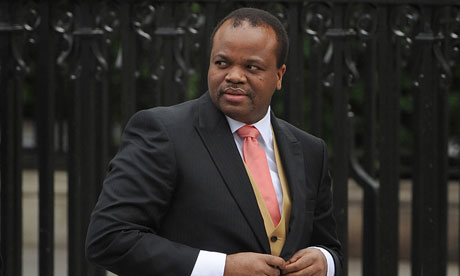by MOSES TOFA
 King Mswati III at Kate Middleton’s marriage to Prince William in 2011. PHOTO/Carl De Souza/AFP/Getty Images/Guardian
King Mswati III at Kate Middleton’s marriage to Prince William in 2011. PHOTO/Carl De Souza/AFP/Getty Images/Guardian
Swaziland has retained and continues to indefinitely retain its controversial status as an absolute constitutional monarchy. It is the only country in Africa with such a ‘distinctly maverick’ political order. The country’s political establishment is regarded by many critics as ‘archaic.’ There is not a vestige of doubt that there is a constant contest between the ancient norms and practices on which the Swazi monarchy is anchored and the progressive forces of democracy and fundamental freedoms which have become the linchpin of the contemporary political order. Swaziland is very rich in a diversity of cultural beliefs and practices which have been subjected to censorious criticism because of their patent incompatibility with contemporary fundamental freedoms. The international community as well as some critical sections of the Swazi community have made many calls for Swaziland to transform to a multi-party state. Contrary to the calls for democratic reforms, the Swazi monarchy has not moved an inch from its traditional position that multi-party politics is ‘divisive’ and ‘incompatible’ with Swazi tradition and therefore ‘undesirable’ in the kingdom. It is important to note that tradition is not static, it changes over time and space and that these changes are not negotiable. That tradition changes is what makes societies progressive.
…
The chiefs are appointed by the king and most of them are either the king’s relatives or those who pay entire allegiance to the king. For example, in 2000, Mswati arbitrarily depose chief Macetjeni and Kamkhweli and appointed Prince Maguga Dhlamini, who is his brother and this occasioned serious disputes in which the deposed kings refused to recognised Maguga. Mswati is superfluously rich King with 13 wives and his lavish lifestyle has engendered controversy and criticism in the country and beyond. The Forbes Magazine estimated Mswati’s wealth to be worth above US $100 million yet more than two-thirds of the Swazis live in brutish wretchedness. In April 2011, concerned Swazis reacted against Mswati’s abuse of taxpayers’ money to buy a private jet, to build new royal residences for his wives, to fund the reed festival and to purchase ‘royal vehicles.’
Pambazuka News for more
